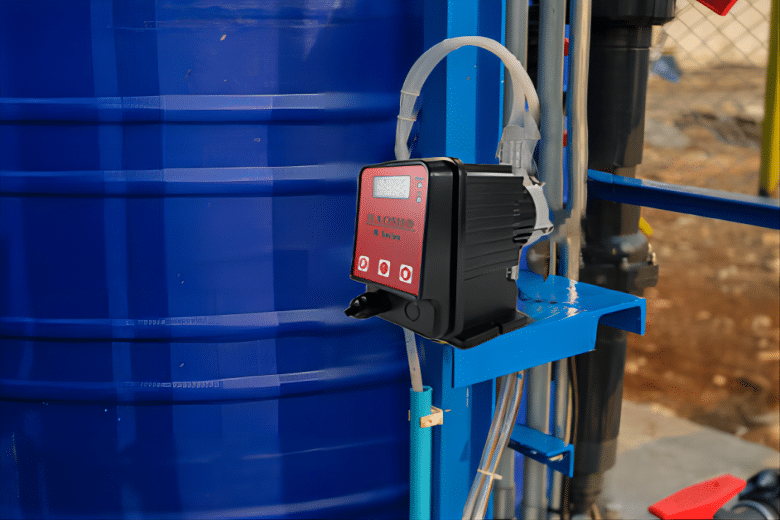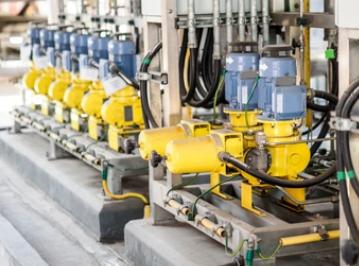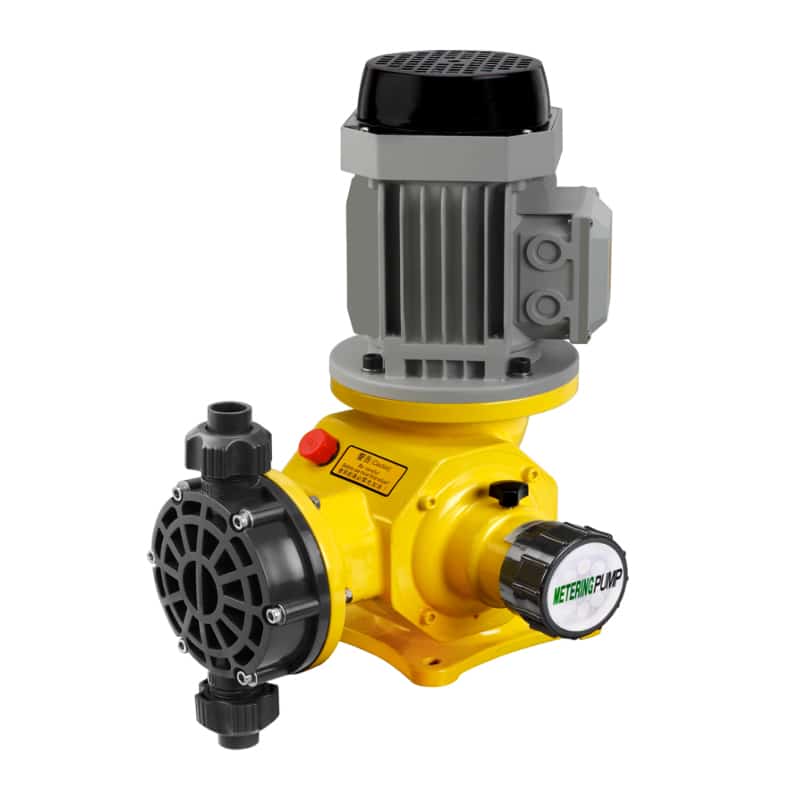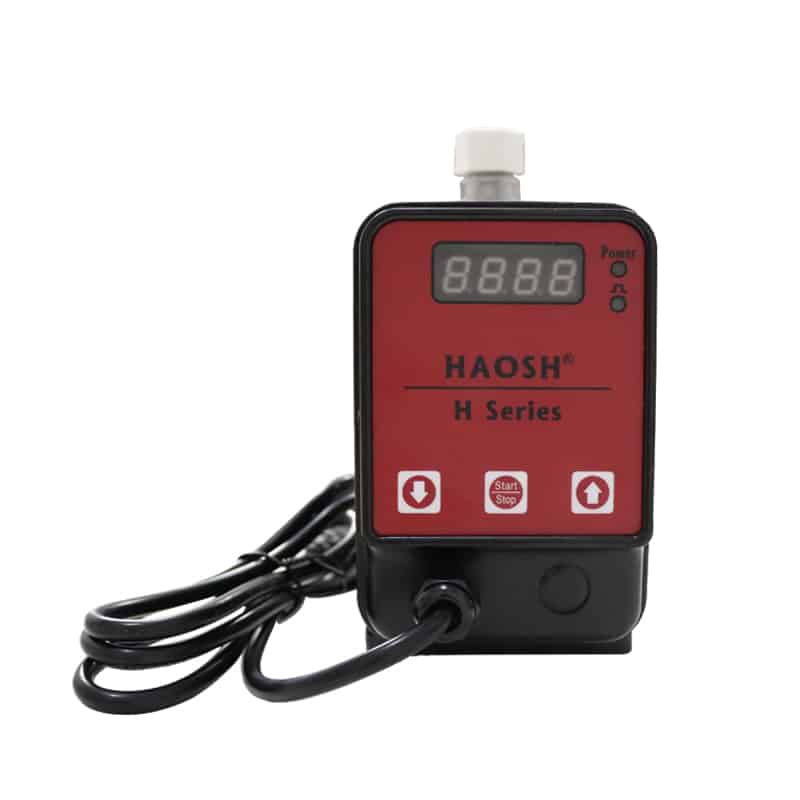Chemical Dosing Pump Calculation

In the field of water treatment, chemical dosing pumps are vital devices used to precisely add chemicals to water for water treatment and purification. Calculations for chemical dosing pumps are a critical step in ensuring that the water treatment process runs effectively and efficiently!
What is a chemical dosing pump?
A chemical dosing pump is a device for automatic chemical dosing, which is mainly composed of a pump body, driving mechanism, control system, and liquid container. By precisely controlling the working speed and time of the pump, a specific amount of chemicals (e.g. chlorinating agent, flocculant, pH adjusting agent, anti-scaling agent, etc.) is accurately dosed into the liquid to be treated to realize the regulation and control of water quality, pH, turbidity, disinfection and sterilization and other parameters.

Calculation of Chemical Dosing Pumps
The formula for chemical dosing pumps usually depends on the type of chemical to be dosed, the water treatment objective and the specific application scenario.
Pharmaceutical Dosage Formula
Dosage (unit: ml/min) = Water Flow (unit: m³/h) × Concentration (unit: mg/L) ÷ 1000
- Water flow rate is the flow rate of the body of water to be treated, usually measured in cubic meters per hour (m³/h).
- Concentration is the concentration of the chemical to be applied in the water, usually measured in milligrams per liter (mg/L).
The Importance of Water Treatment Pumps
Accurate dosing of chemicals: The water treatment process usually requires the dosing of chemicals, such as chlorinating agents, coagulants, pH adjusters, etc., to achieve specific water quality treatment goals, to achieve the accuracy and stability of water quality treatment.
Automated operation: Chemical metering pumps are usually equipped with automated control of the dosing system, which can realize the automatic adjustment and control of the dosage of chemicals.
Improve treatment efficiency: Through precise control of the dosage of chemicals, chemical dosing pumps can ensure that each step in the water treatment process can achieve the best results, thereby improving treatment efficiency and reducing waste of resources.
Cost savings: The correct use of chemical metering pumps can avoid overdose of chemicals or chemical waste situation, in addition, chemical metering pumps can also reduce the cost of labor and maintenance costs, and improve the economic efficiency of the water treatment process.
Ensure water quality and safety: The chemical agents added to the water treatment process have a direct impact on the treatment effect and safety of water quality. Chemical metering pumps can ensure the accuracy and stability of the dosage of chemicals to ensure that the treated water quality meets the relevant safety standards and requirements.
The importance of water treatment chemical metering pump in the water treatment process is self-evident, it can ensure the stability, efficiency, and safety of the water quality treatment process, for the normal operation of the water treatment system provides an important guarantee.
Types of Chemical Dosing Pumps

Piston pump: Piston pump is a common type of chemical dosing pump, its working principle is to use the reciprocating motion of the piston in the plunger barrel to realize the suction and discharge of the pharmaceutical. Piston pumps are usually characterized by high pressure, high precision and stability, and are suitable for occasions with strict requirements on the dosage of chemicals. The HJ-Z Mechanical Dosing Pump is an excellent choice.
Dosing pump: Dosing pumps realize the suction and discharge of chemicals through the up and down movement of diaphragm, so as to realize the dosage of chemicals. Solenoid dosing pumps usually have good sealing and corrosion resistance, and are suitable for the dosing of various chemicals.

Peristaltic pump: Peristaltic pump through the rotary movement of the roller or squeeze plate, the liquid in the hose will be pushed forward, to achieve the delivery of pharmaceuticals and dosing. Peristaltic pump has simple, compact, easy-to-maintain the characteristics of some of the need for low-flow, high-precision occasions.
Gear pump: Gear pumps use the rotary motion of the gear to inhale and discharge the agent to achieve the pharmaceutical dosage. Gear pumps have the characteristics of stable flow rate and smooth pressure, which are suitable for some occasions with high flow rate requirements.
Each type of chemical metering pump has its applicable occasions and advantages and disadvantages, Choosing the right type should be based on specific application needs and process requirements for comprehensive consideration.
Pump Calibration And Maintenance
Calibration
- Regularly calibrate the flow rate and pressure of the pump to ensure the accuracy of its dosage. The frequency of calibration can be determined according to the use of the situation and the manufacturer’s recommendations, usually every certain period or in the event of abnormalities in the calibration.
- Use calibration column for calibration, and follow the calibration methods and procedures provided by the manufacturer.
- During the calibration process, pay attention to checking and adjusting the working parameters of the pump, such as flow rate, pressure, speed, etc., to ensure that it meets the predetermined standards and requirements.
Maintenance
- Regularly clean the inside and outside of the pump to remove the dirt and foreign matter accumulated inside the pump to ensure the smooth operation of the pump.
- Check and replace the seals, valves, pipes and other wearing parts of the pump to ensure its normal operation and sealing performance.
- Regularly lubricate the bearings and moving parts of the pump to ensure its smooth operation and long life.
- Check and adjust the installation position and connection of the pump to ensure that it is solid and reliable, and reduce vibration and noise.
- Pay attention to the running status of the pump, find and deal with abnormal conditions in time, such as abnormal noise, water leakage, temperature abnormality, etc., in order to prevent pump failure and damage.
Summary
Proper chemical dosing pump calculations not only improve the treatment efficiency of water treatment systems and reduce wasted resources, but also reduce operating costs and protect the environment and public health.
The Haosh pump manufacturer has advanced production facilities and a technical team that is constantly working on technological innovations and optimization of dosing metering pumps to ensure that the performance and quality of its products are always at the forefront, as well as providing pump equipment such as agitators, accessories and pulsation dampeners.
